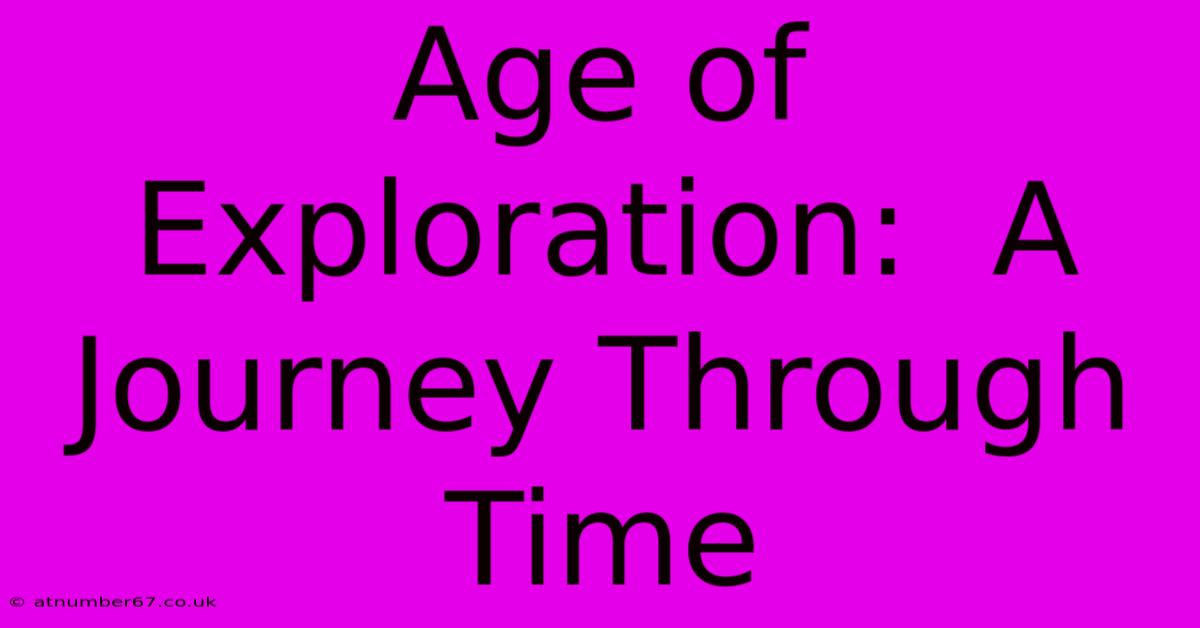Age Of Exploration: A Journey Through Time

Table of Contents
Age of Exploration: A Journey Through Time
The Age of Exploration, spanning roughly from the 15th to the 17th centuries, represents a pivotal period in human history. Driven by a potent cocktail of ambition, technological advancement, and economic incentives, European powers embarked on voyages of discovery that reshaped the world map and irrevocably altered the course of global civilizations. This journey through time delves into the key drivers, significant figures, and lasting consequences of this transformative era.
The Dawn of Discovery: Motivations and Technological Advancements
Several factors converged to ignite the Age of Exploration. Economic motivations were paramount. European nations, particularly Portugal and Spain, sought new trade routes to the East Indies, bypassing the established land routes controlled by the Ottoman Empire. These routes promised access to lucrative spices, silks, and other valuable commodities.
Technological advancements played a crucial role. Improvements in shipbuilding, particularly the development of the caravel – a maneuverable ship capable of long voyages – were instrumental. The invention of the astrolabe and improved navigational tools like the compass allowed sailors to navigate more accurately across vast oceans. Cartography also saw significant progress, with more detailed and accurate maps being created.
Political ambitions also fueled exploration. European monarchs sought to expand their empires, gain prestige, and establish dominance over new territories and trade routes. The spirit of nationalism and the desire to spread Christianity also contributed to the exploratory fervor.
Key Players and Pivotal Voyages
The Age of Exploration boasts a pantheon of legendary explorers. Christopher Columbus, despite his controversial legacy, is inextricably linked to this period, though his voyages did not reach the East Indies as intended, instead "discovering" the Americas.
Vasco da Gama, sailing for Portugal, successfully navigated the Cape of Good Hope, establishing a sea route to India and opening up lucrative trade connections. Ferdinand Magellan, though he perished during the voyage, led the first circumnavigation of the globe, demonstrating the vastness of the oceans and the interconnectedness of the world. Hernán Cortés and Francisco Pizarro led the Spanish conquest of the Aztec and Inca empires respectively, resulting in the brutal subjugation of indigenous populations and the extraction of vast wealth.
These voyages, while showcasing remarkable feats of navigation and endurance, also left a grim legacy of colonization, exploitation, and the devastating effects of disease on indigenous populations. The Columbian Exchange, the transfer of plants, animals, and diseases between the Old and New Worlds, had profound and lasting effects on both hemispheres.
The Impact of Exploration: A Legacy of Change
The Age of Exploration's impact is multifaceted and continues to resonate today. The establishment of global trade networks led to unprecedented economic growth in Europe, while simultaneously creating dependencies and inequalities in the colonized regions. The Columbian Exchange fundamentally reshaped the world's agricultural landscape and diets.
The Age of Exploration also fueled the transatlantic slave trade, a horrific chapter in human history characterized by unimaginable suffering and exploitation. Millions of Africans were forcibly transported to the Americas, contributing to the growth of plantation economies and profoundly influencing the demographics and cultures of the New World.
Furthermore, the Age of Exploration spurred advancements in science, cartography, and technology, laying the foundation for future exploration and scientific discovery. It profoundly impacted linguistic development, with numerous languages spreading and evolving across continents. The exploration of new territories also brought significant geographical discoveries, vastly increasing the understanding of the world.
Conclusion: A Complex and Enduring Legacy
The Age of Exploration was a period of both immense achievement and profound tragedy. While it led to advancements in navigation, technology, and global trade, it also brought colonialism, exploitation, and the devastating consequences of disease and slavery. Understanding this complex legacy is crucial for comprehending the interconnected world we inhabit today, recognizing both the triumphs and the terrible costs of this transformative era. Its impact continues to shape geopolitical dynamics, cultural landscapes, and the global distribution of wealth and power. The Age of Exploration remains a compelling subject of study, offering valuable insights into the human capacity for both remarkable achievement and devastating cruelty.

Thank you for visiting our website wich cover about Age Of Exploration: A Journey Through Time. We hope the information provided has been useful to you. Feel free to contact us if you have any questions or need further assistance. See you next time and dont miss to bookmark.
Featured Posts
-
Where To Stream Age Of Disclosure Easy Guide
Apr 14, 2025
-
Happy Birthday To My Daughter A Life Well Lived
Apr 14, 2025
-
Exploring Tahir Siddiques Financial Journey
Apr 14, 2025
-
Akila Dhanuddaras Age An Unexpected Revelation
Apr 14, 2025
-
Shay Mitchell My Dads Legacy
Apr 14, 2025
